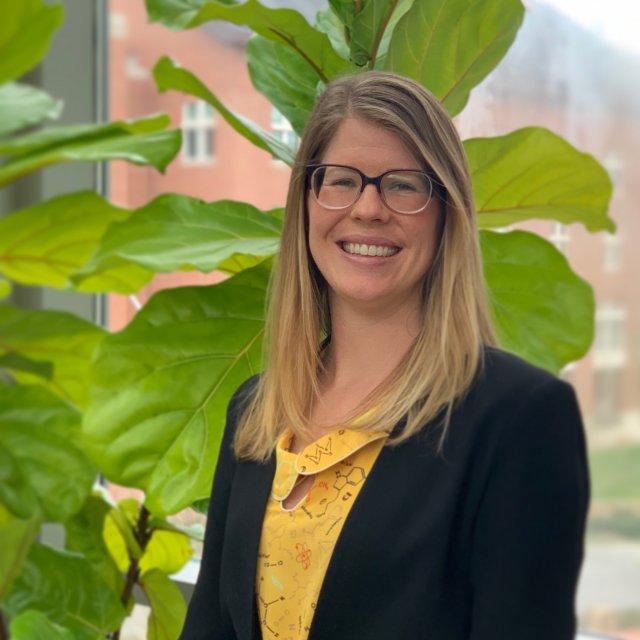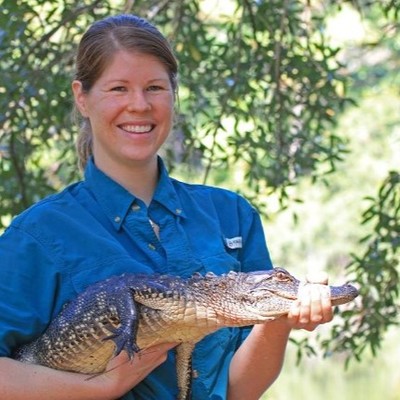Meet EPA Researcher Jacqueline Bangma, Ph.D.

Jacqueline Bangma, Ph.D. is a chemist at EPA focusing on the identification and quantification of emerging per- and polyfluoroakyl substances in humans, wildlife, and the environment.
Tell us about your background.
I received my undergraduate degree in chemistry from the University of Georgia and went on to complete my PhD in marine biomedicine and environmental sciences from the Medical University of South Carolina. In my PhD program I investigated per- and polyfluoroalkyl substances (PFAS) in alligators and fish. Specifically, I studied what tissues in the body had the highest concentrations of PFAS and the potential reproductive impacts of those PFAS on wildlife. Before joining the EPA, I spent several years as a postdoc at UNC Chapel Hill’s School of Public Health studying PFAS impact on the human placenta.
When did you first know you wanted to be a scientist?
I don’t remember the exact moment when I decided to be a scientist. I think it was a culmination of several experiences in my life. When I was in middle school, I started avidly reading Sherlock Holmes. His use of observation and deduction introduced me to the investigational mindset that is the foundation of so much research. From there, I had several dedicated and engaging chemistry teachers in high school that brought out my passion for understanding how chemistry impacts the world all around us. I was especially fascinated with how gas law contributes to the condition known as “the bends” often experienced by scuba divers when they surface too quickly after deep-sea dives.
What do you like most about your research?
There are so many aspects I love about my career as a researcher that it’s hard to pick just one! I would say there are three main things: I really enjoy the highly collaborative atmosphere of environmental sciences research, I love field work, and I love being surprised by my data.

How does your science matter?
For most of my research career I have investigated what tissues per- and polyfluoroalkyl substances (PFAS) bioaccumulate in and their impact on wildlife reproduction or on the human placenta. Understanding how these chemicals, especially some of the newer emerging PFAS, bioaccumulate into various organs is a specific interest of mine. Understanding where PFAS partition can be a powerful step towards identifying what additional research should be considered to understand the full toxicological impact of PFAS on both wildlife and humans.
If you weren’t a scientist, what would you be doing?
I would definitely have to say printmaking. I spend a lot of my free time teaching myself to carve both stamps and Lino blocks and have recently expanded to larger format Linos.
What advice would you give a student interested in a career in science?
Explore the various types of careers possible in science. It took me a while to find the specific niche that I eventually made my career. It also never hurts to ask all sorts of questions of those you do know who are working in science. Even personal questions like how they got interested/connected to their specific research field can be very helpful. I would also suggest anyone interested in a career in research to try doing at least one semester of undergraduate research.
If you can have any superpower, what would you choose?
Growing plants! I don’t have much of a green thumb in real life, but if I had a superpower it would definitely be magically growing plants. Not only would I cover my home in all sorts of greenery, but I would also want to help reforest areas that are being devastated. As I don’t currently have any superpowers, I try to donate to causes that can help reduce and reverse deforestation.
What do you think the coolest scientific discovery was and why?
I have always been fascinated with the history of chemistry and would have to pick the discovery that organic molecules could be synthesized in a lab. This was first proven in 1828 when urea was first synthesized by a German chemist effectively disproving the theory of vitalism. Vitalism at the time believed that the chemicals of living organisms are imbued with a “vital spark” and thus could not be made in a laboratory.
If you could have dinner with any scientist, past or present, who would you choose?
I would have to pick my graduate school mentor Dr. Louis J. Guillette Jr. He was such a force of goodwill, scientific curiosity, and positivity. Before he knew me, I cold emailed him to ask to volunteer in his lab, and he said “Of course!” at a time when so many others would have just ignored my email. If it weren’t for his willingness to give a stranger the opportunity to volunteer in his lab, I never would have gone to graduate school at the Medical University of South Carolina and wouldn’t have the career that I have today. He set such a strong example by which I hope to live by in both my professional and personal relationships. Lou passed away the last year I was in grad school, and I still often think “what would Lou do?” when I am unsure of a decision I have to make.
Editor's Note: The opinions expressed herein are those of the researcher alone. EPA does not endorse the opinions or positions expressed.
